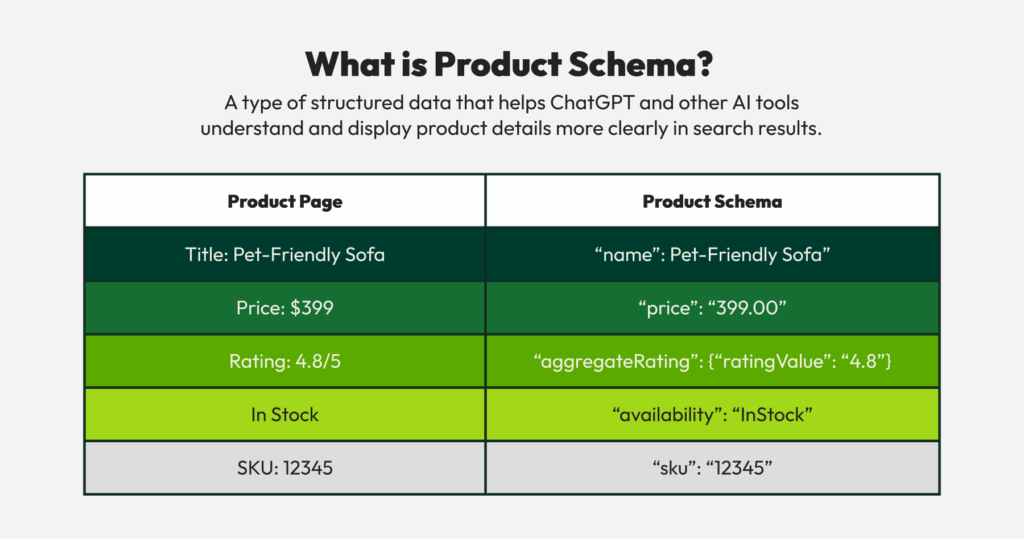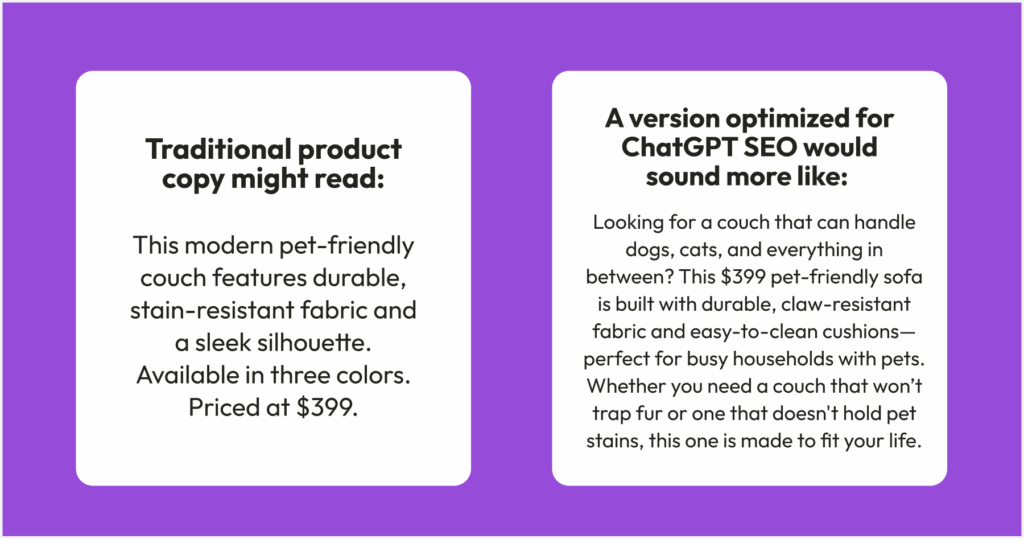
If you’re running an eCommerce brand in 2025, you’re facing a new kind of search revolution—and it’s not coming from Google. It’s coming from ChatGPT.
As of 2024, ChatGPT processes over 1 billion searches per week. And with its latest updates, it’s no longer just answering questions or writing essays (don’t worry, we’ll get into this in the next section).
This shift marks a major ChatGPT impact on SEO. Instead of relying solely on traditional search engines, shoppers are asking AI tools directly for product recommendations because they’re skipping the search results page entirely. If your brand isn’t showing up inside ChatGPT, you’re already missing sales opportunities you can’t see in your usual SEO reports.
This blog is your guide to navigating ChatGPT SEO for eCommerce brands. It will show you how the game is changing, whether it’s actually possible to get your products in ChatGPT, and what steps you can take right now to stay discoverable (and profitable) as AI shopping grows.
In April 2025, OpenAI announced a major upgrade to ChatGPT’s capabilities, turning it from a conversational assistant into a real shopping engine.
The new shopping-focused updates inside ChatGPT include:
But here’s the real ChatGPT impact on SEO: users aren’t searching the way they used to.
Instead of opening a search engine and clicking through ten different sites, shoppers are staying inside ChatGPT and asking direct questions like:
ChatGPT instantly pulls curated results—pulling from your product schema, customer reviews, and broader brand authority.
If your product fits the request and your SEO is optimized for AI search, your listing can appear inside the conversation, not just in a blue link list.
In other words: ChatGPT SEO is about being the answer, not just an option.
Short answer: Yes, but it’s not like buying an ad slot.
ChatGPT isn’t pulling from paid placements, product feeds, or manually uploaded catalogs. It’s using structured data, customer reviews, and organic SEO signals to decide what products to recommend inside conversations.
This shift highlights a major ChatGPT impact on SEO: you can’t pay to play your way into visibility. You have to earn it by making your products easy for AI to find, understand, and trust.
Because ChatGPT relies so heavily on clean product data and strong reviews (not just brand recognition) even newer or niche stores can show up if they’re optimized correctly. That’s right, small and mid-sized eCommerce brands have a real shot at getting discovered.
Meaning if you sell a highly-rated standing desk and your product page is structured properly, you can absolutely show up next to listings from bigger brands. The brands that win in ChatGPT SEO are the ones who invest in clarity, quality signals, and authentic customer trust.
If you want your products to show up when shoppers ask ChatGPT for recommendations, it takes more than a good product and a nice website. Discovery in ChatGPT isn’t about brand size or ad spend. It’s about making your products easy for AI systems to understand, trust, and recommend.
This shift marks a significant ChatGPT impact on SEO for eCommerce brands. Instead of fighting for space on traditional search engine results pages, brands now have a new playing field—one where structured data, authentic reviews, and natural, conversational content decide who gets found first.
Here are the three biggest moves you can make right now to improve your ChatGPT SEO and get your products discovered:
Structured data has always been important for traditional SEO, but with ChatGPT’s new shopping updates, it’s absolutely critical. Structured data—especially Product schema—tells AI exactly what your product is, what it costs, whether it’s in stock, and why customers like it.
If your product pages don’t clearly signal this information, ChatGPT may skip over you in favor of a competitor that does.
Make sure every product page includes structured data covering:
If you’re using Shopify, apps like Smart SEO or JSON-LD for SEO can help you automate much of this without heavy coding or technical knowledge.

If you’re serious about ChatGPT for eCommerce brands, don’t just collect stars. Collect stories. Because in AI-powered search, it’s the context that gets you found. With it’s new shopping features surface real product reviews alongside recommendations, this makes reviews a core part of the ChatGPT SEO equation.
If you’re trying to figure out how to use ChatGPT for SEO, know that it doesn’t rely on traditional keyword stuffing or volume alone. Instead, it looks for trust signals—like detailed, relevant, human-written reviews—to decide what to recommend and when.
Short, vague reviews won’t help you. To improve your visibility, aim for customer feedback that explains:
For example, a review that says, “Perfect couch for families with pets—easy to clean and holds up to daily use,” helps AI systems understand exactly who the product is for and what needs it solves. It also helps get your product in ChatGPT results when someone types a query like, “What’s the best couch for dogs under $400?”
If you want reviews that actually help with ChatGPT SEO, you have to make it easy for customers to share the right details. When you send review requests, prompt buyers with simple, specific questions like:
The goal isn’t to script their feedback, but to encourage richer stories that AI systems can understand and surface in real shopping conversations.
One of the biggest shifts behind the ChatGPT impact on SEO is how users phrase their product searches. In traditional search engines, users often type short, keyword-heavy queries like “pet-friendly couch $400.” In ChatGPT, the behavior is different. Users ask full, conversational questions like “What’s the best couch for dogs under $400?”
If your product descriptions are still written for old-school keyword matching, you’re missing the opportunity to be recommended by AI systems. Understanding how to use ChatGPT for SEO starts by thinking about how real people talk, not how they type.
The goal is simple: you want ChatGPT to instantly understand what your product is, who it’s for, why it’s a strong choice, and when it should be recommended—all based on natural conversation patterns.
For example, if you’re selling a pet-friendly couch for $399, here’s the difference:

This kind of natural language does more than sound friendlier. It maps directly to how people ask AI for product recommendations. It answers implied questions like “Is it durable?” “Is it easy to clean?” and “Is it good for pets?” without forcing users to dig for information.
Optimizing for ChatGPT SEO is only half the equation. If you want your products to stand out in AI-driven shopping experiences, you also need to measure how users are finding and interacting with your brand.
Thanks to recent updates, outbound links from ChatGPT now include a utm_source=chatgpt tag. This gives eCommerce brands a clear way to track how much traffic and how many conversions are coming from ChatGPT product recommendations.
If you are serious about learning how to use ChatGPT for SEO, setting up proper tracking should be a priority. Make sure your Google Analytics, Shopify Analytics, and attribution tools are configured to capture traffic and revenue tied to the utm_source=chatgpt parameter.
From there, monitor key performance indicators such as:
Tracking is especially important if your goal is to get your product in ChatGPT and prove that AI discovery efforts are driving real business results. As the ChatGPT impact on SEO continues to grow, brands that treat this traffic source seriously will be better positioned to adapt and scale as AI-powered shopping behaviors become mainstream.
Understanding where your traffic comes from is no longer optional. It is a core part of building a sustainable ChatGPT SEO strategy that ties visibility directly to revenue.
Optimizing for ChatGPT SEO is not about reinventing your entire strategy. It is about building stronger foundations—structured product data, authentic customer reviews, and natural, conversational content that AI can easily understand and recommend. It is also about learning how to use ChatGPT for SEO in a way that connects visibility to measurable results, not just rankings.
The brands that win in ChatGPT for eCommerce are not the ones who spend the most. They are the ones who understand how discovery is changing and position themselves to meet shoppers where they are already searching.
If you are ready to see how your brand shows up in AI search results, including ChatGPT and Google AI Overviews, start with a free AI Performance Audit. You will get a clear view of where you stand today and actionable steps to strengthen your position for the future.
